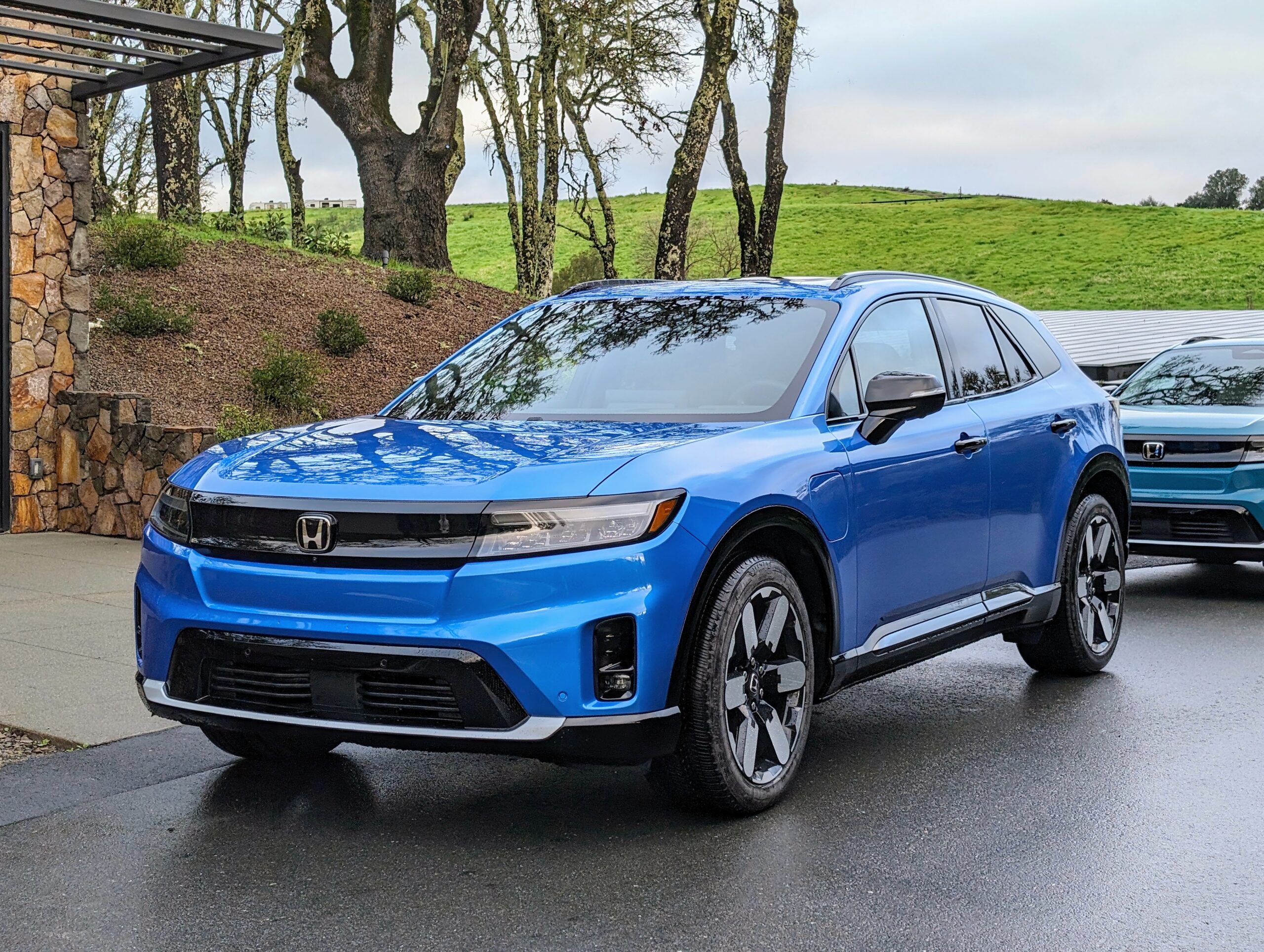
A year ago, a months-long search for a Bolt EUV finally ended, and successfully. Last year, car prices were insane. My local dealer had a few Bolts on the lot, but consistently wanted $5,000 or more over MSRP. So, I had to drive into El Paso looking for deals. It turns out there was one sitting on the lot waiting for a new recall battery, and someone else had a deposit on it. A day before the battery came in, the other buyer backed out, because they found a Bolt EUV somewhere else.
I managed to get the vehicle for pretty close to MSRP before the GM $6,300 off and another $2,000 off for having an Uber driver account. So, I got an almost fully-loaded Premier (only things not on it were Super Cruise and a sunroof) for what bottom-barrel LT Bolts used to go for.
In this article, I’m going to share how this first year of ownership went, and what it probably means for other upcoming GM EV models as the Bolt and EUV go into hiatus for a while.
I honestly have only one complaint about the Bolt EUV that GM could fix, which I’ll get to later in the article.
Other than my one complaint, I knew what I was buying, so I knew going in that it would only charge at 50 kW at fast charging stations. I also has a very realistic idea of what to expect on range, especially on highway trips (it’s never going to get close to 247 miles of range going 80 MPH). The vehicle performed exactly as expected on both range and charging, so I have nothing at all to complain about on those two most important EV issues.

The Bolt EUV is a little bit cute and goofy, so it fits right in here at Sparky’s in Hatch, New Mexico. Image by Jennifer Sensiba.
How The Bolt EUV Exceeded Expectations
For one, I went in expecting a cheap small front-drive crossover experience, and the Bolt has exceeded my expectations on that. It has a much more rigid chassis than cheap gas crossovers usually have, and this is known to be due to the extra rigidity of the battery pack. The suspension isn’t fantastic, but performs well both on and off-road considering that it’s “semi-independent” in the rear. On-road, this is one area where my 2018 LEAF was better, but the looser suspension absorbs many of the uncomfortable bumps in mild off-road driving, like you’d find on a Forest Service road.
Like many front-drive vehicles, it doesn’t have fantastic traction for a hard launch, because the weight transfers onto the rear wheels, but that was to be expected. I suspect adding airbags to stiffen the rear suspension up a bit might make it feel a little better taking off, and have less of a butt-dragging feel.
The better steering response in sport mode was also a pleasant surprise. Many electric power steering systems feel pretty dead or numb, but the EUV reduces assist power and gives more feedback in sport mode, so that’s another area where it can exceed expectations. It’s also worth noting that the regular Bolt EV doesn’t get a different steering feel in sport mode.
Another area where it exceeded expectations was air conditioning. I’ve had cars (especially my 2018 LEAF) that would start to falter a bit on the hottest days. In a gas car, you can throttle it a bit to speed the compressor up, but in my LEAF, it would start letting the cabin heat up when it couldn’t keep up. But, even in 115-degree desert weather, the Bolt can sit for a couple of hours at a time and maintain a comfortable temperature in the cabin. On one occasion, the AC condenser did get heat soaked, but the software was smart enough to shut the AC off for about 20 seconds, kick some fans into more serious gear, and then restart the compressor faster, instantly restoring cold air and comfort.
The Level 2 charging was another thing that impressed. It can handle up to 48 amps at 240 volts (11.5 kW) and I was able to use GM’s charging installation credit, combined with a local utility incentive, to install a 48-amp charging circuit for the car. On the rare occasion that I come home from a long run of regional errands with a low battery, I can plug the thing in and be back to 40% within an hour or two and be able to run more local errands.
Finally, I’m seriously impressed with how well the traction control system performs on Forest Service and other unmaintained or minimally-maintained dirt roads I’ve taken it on.
Early in ownership, I was driving on the stock Michelin self-sealing low rolling resistance tires the vehicle came with. But, seeing how thin those were and how shallow their tread is, I was afraid that taking the vehicle out on some camping trips would leave me with a popped tire. So, I suffered a roughly 15% range loss and switched to Michelin Defender LTX M/S truck tires (full disclosure, Michelin was nice enough to provide me with a set to review, but only after I chose the tire). They’re a lot more difficult to destroy on rocks, have much better tread for off-road driving, and I put a full-sized spare (I bought the wheel and paid for all mounting/balancing costs) in the trunk.
With the extra grip the LTX tires provide, the Bolt’s traction control system has taken it up some surprisingly steep climbs on camping and day trips. The Bolt’s drive unit only comes with an open differential, but the traction control system is pretty good at putting a brake on the slipping wheel, allowing the other front wheel to usually grab and pull me up the hill. It’s not proactive like lockers on a 4×4, but it almost always gets the job done.

The Bolt could probably use a little more clearance for Forest Service roads, but carefully chosen lines and the occasional moving of a log or rock has always let me get to where I wanted to go, even though the Bolt wasn’t designed for this at all.
My One Complaint
The only thing I think the Bolt underperformed on is software, both in the vehicle and on the smartphone app.
In the vehicle, the only thing that really makes the infotainment usable is Android Auto (it also has Apple CarPlay). Most of the time, I just use Android Auto and don’t use the car’s infotainment software at all. Its built-in maps are awful, it has no EV route navigation software, and it’s just generally not very aesthetically pleasing. But, I can get all of that through Android Auto, so I’m not crushed.
The smartphone app is pretty terrible, and there’s no substitute for it. I can’t sign in with a PIN, and it won’t let me use a saved password. It’s slow and sometimes fails to connect to the Bolt. There’s also very little you can do with the app other than check charge levels and pre-condition the car. If GM could only add one thing, I’d ask them to let me change the EV’s charge limit from the app, but the software really needs completely redone.

What This Means For Potential GM EV Buyers
The Bolt and EUV are both coming toward the end of their production, and will be unavailable new for a while until GM comes out with a new Ultium Bolt. If you’re thinking of grabbing one of the last first-generation Bolts, I’d recommend going ahead and doing so, but only if you know it’s not very fast charging on road trips. For a local and regional grocery getter, it’s totally fine. I personally road trip mine, but I’d recommend visiting ABRP’s website and running some simulations before you go buy one with road trips in mind so you aren’t disappointed.
But, you might also consider waiting for the Equinox EV, which is supposed to start selling in the fall. They’ll only sell higher-spec Equinoxes first, but there will eventually be a front-drive basic one for pretty close to what Bolt EUVs sold for, and it should have very similar capabilities. However, the Ultium-based Equinox will have much faster Level 3 charging than the Bolt, so it would be a lot more pleasant on road trips (especially once more charging stations go in).
Another thing the Equinox is probably going to do better is software. GM is making a seemingly suicidal move getting rid of Android Auto and CarPlay, but they say they’re making a much better built-in software package. You’ll definitely want to check on that before pulling the trigger in the fall or winter.
Overall, though, I think GM is making reasonably good EVs, and they’ll get a lot better once the affordable Equinox comes out. I wouldn’t be afraid of buying one unless a Tesla is in your budget and you like Tesla’s minimalist approach to vehicle design.
Featured image and all images by Jennifer Sensiba.
I don’t like paywalls. You don’t like paywalls. Who likes paywalls? Here at CleanTechnica, we implemented a limited paywall for a while, but it always felt wrong — and it was always tough to decide what we should put behind there. In theory, your most exclusive and best content goes behind a paywall. But then fewer people read it! We just don’t like paywalls, and so we’ve decided to ditch ours. Unfortunately, the media business is still a tough, cut-throat business with tiny margins. It’s a never-ending Olympic challenge to stay above water or even perhaps — gasp — grow. So …





